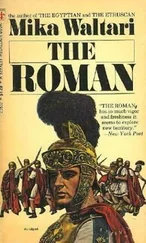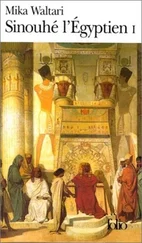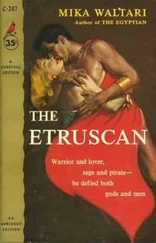Lamentable though this incident was, it was not without its comic side, and three well-dressed boys of whom the eldest was perhaps eleven years old burst into uproarious laughter at the spectacle. But the fourth wept softly. He was not more than five. He sat on the arm of a man in a flowered silk kaftan in whom to my amazement I recognized Sultan Suleiman himself. There was no mistaking his smoke-colored complexion, though in his plain dress and low turban he looked strangely short in stature. I at once threw myself down and kissed the ground before him and his sons.
All was confusion round the tree. Ropes lay about, ladders were propped against the trunk, and efforts had clearly been made to bring the monkey down by squirting water at it. Even at this distance I could see that it was sick, and it moaned as it clung helplessly to the bough. The Kislar-Aga bent low before the Sultan and suggested that I should be sent up the tree since I knew the monkey, and indeed had brought the bewitched animal to the Seraglio. If I failed he would have me beheaded, and so no harm would come of my admission to the forbidden gardens.
His harsh words so wounded me that I rose at once and said, “I never asked to come here; I was induced with tears and prayers to offer my help. Call down those blockheads. They scare the poor beast. And stop that drumming. Then give me a little fruit and I’ll try to coax it down.”
The Kislar-Aga said, “Is it thus you speak to me, miserable slave? And know that since early morning we have tried to fetch it down with fruit.”
But Sultan Suleiman said curtly, “Call them down and send everyone away. You, too, have my leave to go.”
When the chattering eunuchs had disappeared with their ropes, ladders, and syringes, complete stillness reigned. The little boy in the Sultan’s arms had ceased sobbing, and only the moans of the monkey could be heard. Not venturing to address the Sultan I turned to his eldest son and said, “Noble Prince Mustafa, the monkey is sick. That’s why it fled up the tree. I shall try to coax it down.”
The dark, handsome boy nodded haughtily. I sat down upon the ground with Rael in my arms and called softly and coaxingly, “Koko! Koko!” The monkey peeped suspiciously through the branches and gave a few faint cries, but would not move. Then I said to Rael, hoping that the Sultan would hear, “Dear, faithful dog! Koko doesn’t know me in my new clothes, and thinks I’m one of the eunuchs. You call her. Perhaps she’ll remember playing with you on board ship. Try to call her down from the tree.”
Rael looked up into the treetop, pricked his ears, and whined softly, then barked twice. The monkey climbed down a little way to get a clearer view, and Prince Jehangir still on his father’s arm held up his little hands and called, “Koko! Koko!” The monkey hesitated, but as Rael went on whining she made up her mind and climbed swiftly down. She sped up to me, sprang into my arms, and hugged me with her white-whiskered cheek against mine, her whole spindly body shaking with fever.
Koko stretched out one arm and stroked Rael, then pulled his ears and tail, whereupon Rael gently caught her hand in his teeth and growled warningly. At the beginning of our voyage the monkey had tormented the life out of Rael, pinching him at every opportunity and then taking flight to the top of the mast, leaving the dog barking furiously below. But later they both enjoyed the game and became friends; sometimes they basked together on deck and Koko lay with her arms about Rael’s neck, or with nimble fingers plucked fleas from his coat.
But now she broke off her play in a terrible fit of coughing, one tiny hand pressed to her chest. Tears flowed from the haggard eyes, and between paroxysms she uttered heartrending cries as if to tell me how wretched and lonely she felt. Rael too began to whine piteously, and licked Koko’s limp hand as if he understood. The princes came to stroke the sick monkey and to my surprise the Sultan drew near too, and spreading out the skirts of his kaftan sat down beside me on the ground so that Prince Jehangir could touch the little creature. The Sultan said to me, “You must be a good man, since animals trust you. Is the monkey sick?”
I replied, “I have studied medicine both in Christian countries and among Moslems, and I know that this poor beast has fever. It will die, if Allah so wills. It could not survive this climate, and the night spent in the tree has worsened the chill. I think it fled up the tree to die there alone, for most of the creatures we try to tame prefer to die in solitude, away from humans.”
Prince Mustafa said hotly, “The monkey has lived in warm rooms and worn warm clothes every day, for it’s my brother Jehangir’s pet. The slave who’s to blame for its illness shall pay for it with his head.”
I answered, “No one is to blame for this illness, for monkeys are most sensitive to changes of climate, and even in the palaces of sunny Italy they sicken and die. If this little monkey should perish too, it will be by the will of Allah and we cannot prevent it. Nevertheless I’ll prepare a cough mixture to soothe the pain.”
The Sultan said, “Will you indeed give this poor beast medicine? Most physicians consider it beneath their dignity to treat animals. Yet the Prophet loved them, especially camels and cats. Indeed animals, unlike men, are without guile and I hate to see them suffer. But I have many animal doctors in my service and shall need you no longer. Selim, give him the monkey’s clothes. Mustafa, give him the chain. And you, Michael, dress the monkey and fasten the chain about its neck; then leave us.”
The boys handed me a little wool-lined velvet kaftan and a thin silver chain, but Koko struggled when I tried to put them on her. At last I succeeded, and laying the end of the chain in Prince Jehangir’s little hand I told the boys to give the monkey some warm milk. Then I rose, called my dog, and prepared to leave the gardens. But at this Koko flew into a passion, kicked and struggled and tried to bite the princes, then tore loose and ran after me. With the chain rattling behind her she scrambled up into my arms and clung there.
The Sultan was at a loss. He put down the little boy, who ran up to me crying, flung one arm around my leg and raised the other to stroke the monkey. It was then I noticed that the poor little fellow was club- footed, and that a hump was beginning to show beneath his silken coat. His sallow face was as ugly as the monkey’s, and he was almost stifled with his sobs. Then Selim, the third prince, clutched his head and cried in a shrill voice that he was going to faint. The Sultan shouted, “Mustafa and Muhammed! Take Jehangir in at once and this man too, to look after the monkey. Send the Kislar-Aga to me and call the tselebs.”
As I bent to rub Prince Selim’s temples the Sultan signed to me to go, no doubt meaning the boys to take me out of the harem gardens to their own quarters in the inner court. But the young princes misunderstood him and instead led me to Prince Jehangir’s rooms where the monkey’s cage was. I could feel the eyes of agitated eunuchs following me from behind the bushes, but did not then know enough to be afraid.
Carrying the monkey and leading Prince Jehangir by the hand I followed the boys to Sultana Khurrem’s pavilion of many-colored tiles, thus committing all unawares the gravest possible offense. Mustafa, Muhammed, and Selim, all being over seven years old, lived with their tselebs, or tutors, in the third courtyard; but the sickly Jehangir, who was only five, remained in his mother’s pavilion and was allowed to keep his monkey there. I was certainly somewhat startled to see the women attendants hastening toward us unveiled, in the belief that I was a eunuch, yet I still had no misgivings and entered Prince Jehan- gir’s spacious room in which stood the monkey’s gilded cage and its bed. I ordered the women to fetch some hot milk at once for the sick animal, while the boys sat down on cushions to watch all I did. Rael hurried round the room sniffing into every corner, and Prince Jehangir, like any other tear-stained and weary child, began crying for his mother.
Читать дальше











